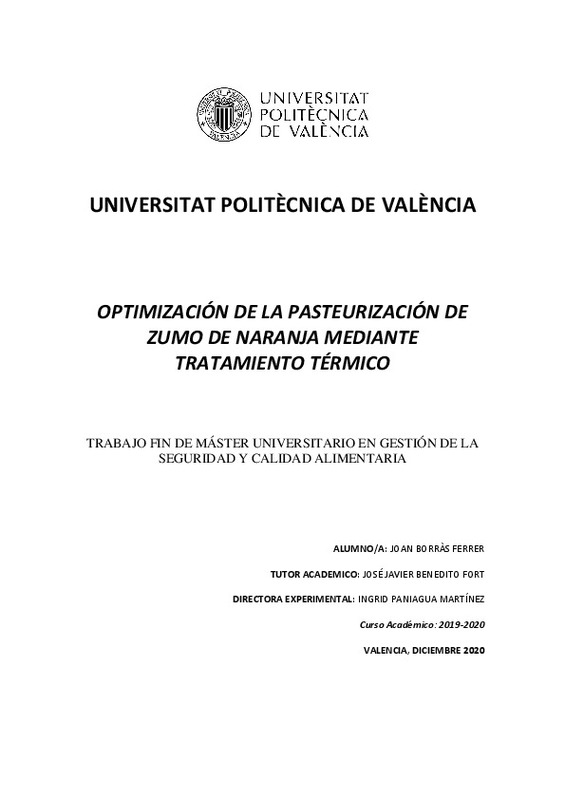JavaScript is disabled for your browser. Some features of this site may not work without it.
Buscar en RiuNet
Listar
Mi cuenta
Estadísticas
Ayuda RiuNet
Admin. UPV
Optimización de la pasteurización de zumo de naranja mediante tratamiento térmico
Mostrar el registro sencillo del ítem
Ficheros en el ítem
| dc.contributor.advisor | Benedito Fort, José Javier
|
es_ES |
| dc.contributor.advisor | Paniagua Martínez, Ingrid
|
es_ES |
| dc.contributor.author | Borràs Ferrer, Joan
|
es_ES |
| dc.date.accessioned | 2020-12-28T11:57:15Z | |
| dc.date.available | 2020-12-28T11:57:15Z | |
| dc.date.created | 2020-12-11 | |
| dc.date.issued | 2020-12-28 | es_ES |
| dc.identifier.uri | http://hdl.handle.net/10251/157865 | |
| dc.description.abstract | [ES] La popularidad del zumo de naranja ha generado la necesidad de conseguir un zumo envasado lo más similar posible al zumo natural 100% exprimido, tanto organoléptica como nutricionalmente. Para ello, se están llevando a cabo mejoras en los tratamientos del zumo para poder cumplir las expectativas del consumidor. En el presente TFM se han caracterizado los parámetros tiempo-temperatura de un pasteurizador de placas, para aplicar de manera experimental ensayos con tres niveles de inactivación, uno más agresivo para inactivar totalmente la flora microbiana y otros dos para reducir la población microbiana del zumo a distintos niveles. Los resultados obtenidos no mostraron ningún tipo de correlación entre la intensidad del tratamiento y la inactivación microbiana, probablemente debido a que, durante algún punto del tratamiento térmico, muestreo o siembra se contaminó la muestra. Además, se planteó y resolvió un problema de optimización de tratamiento térmico de zumo de naranja, cuyo objetivo fue minimizar la perdida de vitamina C cumpliendo con las restricciones de eliminación del 99,999% de Alicyclobacillus acidoterrestris y Escherichia coli O157:H7 y de inactivación del 90% de la enzima PME. Se observó que al reducir el tiempo del tratamiento térmico y aumentar la temperatura de este, la retención de vitamina C es mayor, dando lugar a un zumo de mayor calidad. | es_ES |
| dc.description.abstract | [EN] The popularity of orange juice has created the need to achieve a packaged juice as similar as possible to 100% squeezed natural juice, both organoleptically and nutritionally. To this end, improvements are being made in the juice treatments in order to meet consumer expectations. In the present TFM, the time-temperature parameters of a plate pasteurizer have been characterized, to experimentally apply tests with three levels of inactivation, one more aggressive to completely inactivate the microbial flora and another two to reduce the microbial population of the juice to different levels. The results obtained did not show any type of correlation between the intensity of the treatment and the microbial inactivation, probably due to the fact that, during some point of the heat treatment, sampling or plating, the sample was contaminated. In addition, an orange juice heat treatment optimization problem was proposed and solved, the objective of which was to minimize the loss of vitamin C by complying with the elimination restrains of 99.999% of Alicyclobacillus acidoterrestris and Escherichia coli O157: H7 and of inactivation of 90 % of PME enzyme. It was observed that by reducing the heat treatment time and increasing its temperature, the retention of vitamin C was greater, giving place to a higher quality juice. | es_ES |
| dc.format.extent | 21 | es_ES |
| dc.language | Español | es_ES |
| dc.publisher | Universitat Politècnica de València | es_ES |
| dc.rights | Reserva de todos los derechos | es_ES |
| dc.subject | Tratamiento térmico | es_ES |
| dc.subject | Pasteurización | es_ES |
| dc.subject | Zumo de naranja | es_ES |
| dc.subject | Optimización | es_ES |
| dc.subject | Escherichia coli | es_ES |
| dc.subject | Alicyclobacillus acidoterrestris | es_ES |
| dc.subject | Pectinmetilesterasa. | es_ES |
| dc.subject | Heat treatment | es_ES |
| dc.subject | Pasteurization | es_ES |
| dc.subject | Orange juice | es_ES |
| dc.subject | Optimization | es_ES |
| dc.subject | Pectinmethylesterase | es_ES |
| dc.subject.classification | TECNOLOGIA DE ALIMENTOS | es_ES |
| dc.subject.other | Máster Universitario en Gestión de la Seguridad y Calidad Alimentaria-Màster Universitari en Gestió de la Seguretat i Qualitat Alimentària | es_ES |
| dc.title | Optimización de la pasteurización de zumo de naranja mediante tratamiento térmico | es_ES |
| dc.type | Tesis de máster | es_ES |
| dc.rights.accessRights | Abierto | es_ES |
| dc.contributor.affiliation | Universitat Politècnica de València. Departamento de Tecnología de Alimentos - Departament de Tecnologia d'Aliments | es_ES |
| dc.contributor.affiliation | Universitat Politècnica de València. Escuela Técnica Superior de Ingeniería Agronómica y del Medio Natural - Escola Tècnica Superior d'Enginyeria Agronòmica i del Medi Natural | es_ES |
| dc.description.bibliographicCitation | Borràs Ferrer, J. (2020). Optimización de la pasteurización de zumo de naranja mediante tratamiento térmico. Universitat Politècnica de València. http://hdl.handle.net/10251/157865 | es_ES |
| dc.description.accrualMethod | TFGM | es_ES |
| dc.relation.pasarela | TFGM\128477 | es_ES |
Este ítem aparece en la(s) siguiente(s) colección(ones)
-
ETSIAMN - Trabajos académicos [3284]
Escuela Técnica Superior de Ingeniería Agronómica y del Medio Natural






